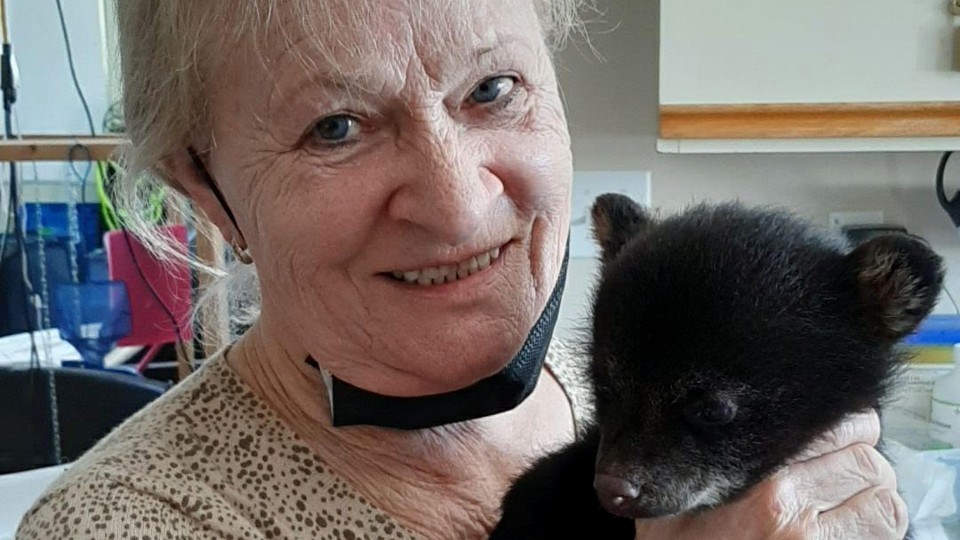Judy Miller has been a dedicated animal rehabilitation and release volunteer for decades, starting at Wild at Heart Refuge Centre and now at the Turtle Pond Wildlife Centre in Val Caron. Turtle Pond is a completely volunteer-run organization that focuses on turtles, but is seeing an annually increasing average of some 200 animals, of a variety of species, per year.
Miller is always there, day or night, to help injured or orphaned wildlife all over Northern Ontario.
“I do turtle rescues. People will call and say a bobcat has their leg caught in a snare in Worthington, or a wolf has been hit by a car and needs treatment. Last fall, we had a call about a fox with mange by the South End Library. We set a live trap and after a month of checking every four hours, including at 2 and 6 a.m., we were able to treat, then release, the fox. I can’t stand the thought of an animal being stuck in a trap, especially in winter, so we always check regularly.”
Her dedication to the role is evident in the hours she invests in saving wildlife. Much of her free time is spent volunteering when needed.
“I don’t even have my flower beds done at the sides of the house. Just when I think I’ll work on them, I get a call.”
Turtle Pond Wildlife Centre took in 11 bear cubs last fall and, with their care, have all recently reached a healthy weight of 15 pounds.
“The mothers might have been shot and the young ones didn’t know how to survive on their own. We applied to the Ministry of Natural Resources (MNR) to get permission, and these bears were just released by the MNR last week. We have seen bears, foxes, raccoons, turtles, groundhogs, skunks, birds, and cats.
“A turtle was hit by a car, but we harvested the eggs in an incubator. Ninety hatched last year and were released. I would stay Monday evenings, helping out for quite a few hours, getting them ready.”
With a nursing background and a love for animals, Miller found meaningful volunteer work by combining her skills and interests.
“I used to be a nurse at Memorial Hospital and went off work due to injury. While off on disability, I didn’t know what to do. I saw a posting seeking medical experience, went out, and loved it. I’m still nursing, just a different critter. I get calls at all times, and it doesn’t matter the weather. I can’t stand the thought of something suffering.”
Miller’s efforts have travelled by word of mouth to people she has never met who come to her for wildlife assistance.
“A man drove up and said, ‘I hear you’re in wildlife and there’s a snapping turtle nearby that’s going to get hit by a car.’ One day, there was a box in my driveway with a raccoon that fell off a barn. People ask, ‘What’s in front of your door this time?’ Someone had put an injured mouse on my doorstep. I never know what I’m going to find when I come home.”
As she shows me her sanctuary of a yard, a natural, safe space for wildlife, she explains how her involvement in wildlife rescue and rehabilitation contributes to her own wellbeing.
“Sometimes I don’t feel good. I go to physio for back and hip problems. Once I’m at Turtle Pond or out rescuing wildlife, I’m focused on that and it’s a good distraction from the pain. It’s so worthwhile, I can’t imagine life without it.”
Miller sees the importance of volunteering and mentors new volunteers as they learn how to help care for rescued wildlife.
“One time, when I was still at Wild at Heart, a mallard duck [that was mistreated by humans] was brought in and we didn’t think it would survive. I took it home to see what I could do with my nursing experience, and it recovered. Some volunteers and interns cry at the sight and say, ‘I don’t know if I can do this.’ I say, ‘Keep your mind set on what we save. You are saving lives’.”
She also points to the need to keep wildlife in mind, as we live our lives.
“Years ago, I saw on the news that wildlife had dropped 40 per cent since the 1970s worldwide, so we have to do our best. With houses being built, animals are losing areas where they survive.”
Turtle Pond Wildlife Centre relies on the public for funding, which directly supports the wildlife in their care. Turtle Pond does not receive government funding. Anyone interested in donating can visit TurtlePondWC.com/donate to help wildlife rehabilitation efforts in Northern Ontario.
Judy Miller’s Words of Volunteer Wisdom
"I have lupus and fibromyalgia. Some days I feel crappy, but I go anyway and when I focus on that, I don’t think as much about my symptoms. I feel better after being there. Turtle Pond is run entirely by volunteers, and we just don’t have enough. Especially in the evenings, we need people to help with feeding. Raccoons are bottle-fed, baby squirrels are syringe-fed. Anyone interested in looking after animals can fill out an online form on Turtle Pond Wildlife Centre’s website. You’ll get started with an orientation and will work with other people who have done it before. You are trained then supervised to know what to do and how to do it. It is so rewarding."
Erin Medakovic is a freelance writer and editor in Sudbury, and a Sudbury.com contributor.
